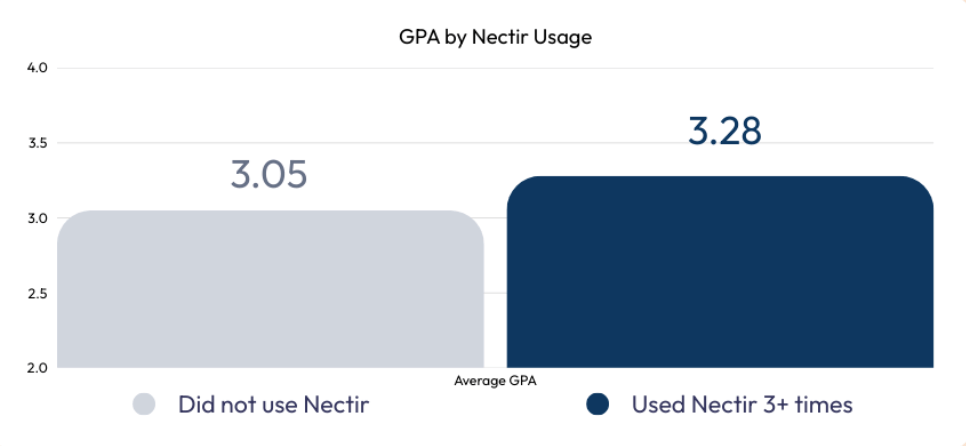
Artificial Intelligence has become one of the defining topics in education. However, the rapid pace of AI’s growth and adoption brings with it a degree of skepticism—rightfully so. Without intentional implementation, AI risks widening the very gaps it aims to close.
Recent research highlights the importance of equity as a foundational principle for AI in education. Every learner, regardless of background or resources, should have equitable access to academic support in today’s technology-driven landscape.
‘Every learner, regardless of background or resources, should have equitable access to academic support in today’s technology-driven landscape.’
A new study conducted by Los Angeles Pacific University (LAPU) examined how AI-powered course assistants—specifically those delivered through Nectir technology—impacted student performance. The findings reveal both significant promise and lingering challenges in making educational AI tools truly equitable and effective.
Evaluating AI’s Impact on Student Success
LAPU collaborated with Nectir, an AI-powered course assistant platform, to rigorously assess whether AI course assistants could improve student outcomes. The question at hand: Can students improve academic performance through meaningful interaction with AI—without relying on it to simply provide answers?
The resulting study, published in Open Praxis, is one of the largest of its kind. It covered more than 2,000 course enrollments across 99 classes, analyzing student engagement with LAPU’s GenAI course assistant, “Spark,” powered by Nectir technology.
LAPU, a fully online, asynchronous university, primarily serves full-time working adults. More than half of its nearly 1,900 students are enrolled part-time. Given the limited real-time interaction in asynchronous formats, the integration of AI for immediate, 24/7 academic support was seen as a potential solution to common engagement and accessibility gaps.
Key Findings from the Study
The study uncovered several notable outcomes:
– Students who engaged with the AI assistant three or more times showed measurable increases in GPA, even after controlling for age, gender, and ethnicity.
– On average, GPA increased by 7.5%.
– Results held consistent across four different statistical models, suggesting robust findings.
– The most significant academic improvements occurred with regular engagement, not one-time usage. Students who interacted consistently demonstrated deeper engagement with course content.
– Importantly, the AI assistant was designed to promote critical thinking—not to complete assignments. Its Socratic approach encouraged problem-solving and deeper understanding, rather than shortcuts.
The findings suggest that when students and faculty treat AI as a learning partner rather than a replacement for effort, educational outcomes improve.
Addressing Equity and Access
Despite encouraging results, the study also raised critical questions. Not every student used the AI assistant, often due to accessibility issues or discomfort with unfamiliar tools. This highlights a broader concern: Could AI adoption deepen the digital divide?
To address these risks, LAPU’s implementation focused on ease of access. The assistant was embedded directly within the learning management system (LMS), avoiding the need for external apps or extra logins. Paired with in-course walkthroughs and accessible training, this approach aimed to reduce friction for users of all experience levels.
The technology also adhered to strict data privacy standards, with instructor-level customization options that ensured the tool supported—rather than undermined—academic integrity and independent learning.
The broader takeaway: educational technology must reduce barriers and ensure innovation does not reinforce existing inequalities.
Looking Ahead
While the study represents a strong early signal for the potential of AI-powered learning tools, several open questions remain. How can institutions ensure all students feel empowered to use these tools? How will academic integrity and privacy evolve alongside rapid AI innovation? And how might educators measure success beyond GPA—looking instead at student confidence, persistence, and skill growth?
The full study has been peer-reviewed and is published in Open Praxis. For those seeking details on the methodology and data, the complete research paper is available here.
Share this:
- Click to share on Twitter (Opens in new window)
- Click to share on Facebook (Opens in new window)
- Click to share on LinkedIn (Opens in new window)
Like this:
Like Loading…
Related
Original Article Published at Edtech Digest
________________________________________________________________________________________________________________________________

